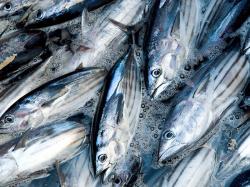New Zealand Skipjack Tuna Purse Seine Fishery Certified As Sustainable
August 17, 2017 | 3 min to read

The Talley’s New Zealand skipjack tuna purse seine fishery, operated by Talley’s Group Limited, has been certified as sustainable, tipping the scale of MSC certified seafood out of New Zealand to over 50% of its total wild-caught commercial catch.
To achieve MSC certification, the New Zealand skipjack fishery has demonstrated that it meets the high bar of sustainability set by the MSC Fisheries Standard. Widely recognized as the world’s most credible and robust standard for sustainable fishing, the MSC Fishery Standard is founded on three principles: healthy fish stocks, minimal impact on the wider marine environment and effective fishery management.
Talley’s purse seine skipjack fishery is the second tuna fishery in New Zealand to be MSC certified joining the Tuna Management Association’s albacore troll fishery in bearing the blue label.
“Tuna is an important species globally, and increasing the supply of certified sustainable tuna is a key step in maintaining access to this resource for future generations. As a highly migratory group of fishes, tuna are notoriously difficult to manage, but by passing the MSC Fisheries Standard, Talley’s and the New Zealand Ministry for Primary Industries have demonstrated sound management of their skipjack resource,” said Anne Gabriel, MSC Program Director Oceania
“By gaining MSC certification for our skipjack fishery we have not only gained a competitive edge in the market, for which the MSC label is in high demand, but we have also shown that we are fishing responsibly and sustainably. In doing so we are providing the assurance to the public at large, and to our local fishing communities in particular, that we are committed to maintaining our fishery resources in a healthy state for future generations,” said Andy Smith of Talley’s.
The purse seine fishery has been operational since the 1970s, predominantly off the west and east coasts of New Zealand’s North Island, and to a lesser extent off South Island. It uses free-school fishing methods and skipjack comprises over 98% of the catch. The size of the catch varies from year-to-year depending on environmental conditions, which can have a variable effect on skipjack migration to New Zealand waters. There is currently no FAD fishing inside the New Zealand EEZ.
Original scoring upheld
The 18-month certification process was carried out by independent assessment body, Acoura Marine. An objection to the fishery’s original score, relating to the effectiveness of the harvest strategy, was filed by the Parties to the Narau Agreement (PNA), which holds MSC certification on skipjack and yellowfin tuna in the Western & Central Pacific, and who argued for a higher score to be awarded. However, after thorough analysis by an Independent Adjudicator, the certifier’s original scoring, harmonised across multiple skipjack fisheries, was upheld.
The fishery joins 311 MSC certified fisheries globally, landing 12% of global marine catch and is the eighth certified fishery in New Zealand.
Fisheries are assessed by third-party, independent auditors against the three core principals of the MSC Standard, being fishery stock health, impact on the marine environment and management of the fishery.
MSC certified fisheries are continually monitored and must complete annual surveillance audits to ensure they continue to meet the MSC Standard. MSC certification is valid for five years after which a reassessment must take place. More than 1,200 improvements to fishing practices and environmental management have been delivered by MSC certified fisheries since 2000.
To maintain its certification the Talley’s fishery will need to work with management organisations to deliver improvements against three conditions, including the requirement for well-defined harvest control rules to be developed and implemented by the Western Central Pacific Fisheries Commission. The fishery is also required to implement an action plan to mitigate unintended impacts on spine-tail devil rays.
Source: Marine Stewardship Council (MSC)
